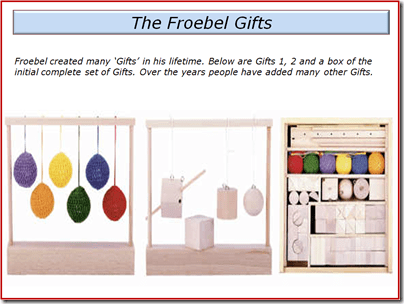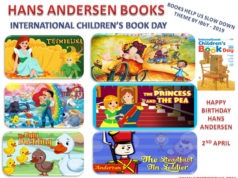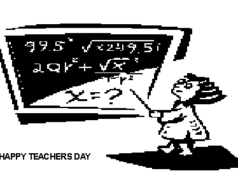Image courtesy: Mike Pegg’s Blog
‘Play is a mirror of life’
Friedrich Froebel, (1782-1852) – the German founder of Kindergarten system was born in April 1782. He changed the way we think about early childhood education. Friedrich started a Play and Activity Institute which featured games, play, songs, stories, and crafts to stimulate imagination and develop physical and motor skills. He designed balls, wooden blocks, tiles, sticks and rings to demonstrate that children learn by playing. These objects were important part of child’s life as these gifts will teach the child to use his environment as an educational aid, give a child an indication between human life and nature and create a bond between the adult and the child.
The word ‘Kindergarten’ mean, kinder + garten = Infant garden – garden for children in tune to nature where they can grow in free atmosphere in open surroundings. When Friedrich Froebel flourished the Kindergarten, he thought of kids to be tiny flowers who need the care and flower.
The kindergarten was essentially based on:
– toys for sedentary creative play
– games and dances for healthy activity
– observing and nurturing plants in a garden for stimulating awareness of the natural world.
His philosophy of education rested on four basic components:
– Free self-activity
– Creativity
– Social participation
– Motor expression
Froebel developed a specific set of 20 ‘gifts’ – physical objects such as balls, blocks, and sticks – for children to use in the kindergarten. Froebel carefully designed these gifts to help children recognize and appreciate the common patterns and forms found in nature. Froebel’s gifts were eventually distributed throughout the world, deeply influencing the development of generations of young children. First, a ball, second – a sphere and a cube and third, a wooden cube, divided once in each direction to create eight smaller cubes. You can read more on this in detailed blog of Mike Pegg – 3 tips of understanding Friedrich Froebel’s work on strength.
Today’s times are changing. Children need to compete with their peers and with the technology booming in, computers and mobiles have found way to the smaller kids who just pick up the gadgets and find way to communicate. Moreover, closed activities indoors need a break for a changeover to view the outside world – into gardens, parks and places of kids interest like the zoo, picnic spots, etc. Kids learn faster in open spaces and like we have the system of ‘Shantiniketan’ in India (started by Rabindranath Tagore) – studying in open skies in a garden, under the shade of trees is a unique way of learning. A balance with indoor and outdoor activity is just the need of the hour.
To sum up, a Kindergarten should be in a free atmosphere based on Swagat Children Library environment which follow the principles.
An environment of Kindergarten/Play or Activity center which :
• is physically safe but intellectually challenging, promoting curiosity, enquiry, sensory stimulation and aesthetic awareness
• demonstrates the unity of indoors and outdoors, of the cultural and the natural
• allows free access to a rich range of materials that promote open atmosphere for opportunities for play and creativity
• entails the nursery, working in close partnership with parents and other skilled adults
• is educative rather than merely time pass, keeping busy schedule
• promotes interdependence as well as independence, community as well as individuality and responsibility – free atmosphere.








